高中英语人教版必修5 unit1 Great Scientists Reading课件(83张 )
文档属性
| 名称 | 高中英语人教版必修5 unit1 Great Scientists Reading课件(83张 ) | 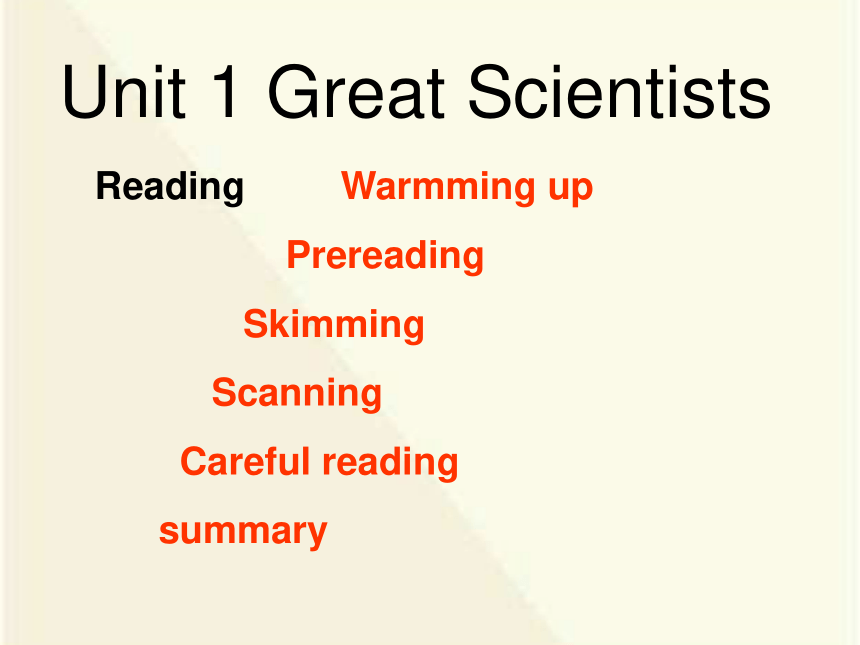 | |
| 格式 | zip | ||
| 文件大小 | 854.7KB | ||
| 资源类型 | 教案 | ||
| 版本资源 | 人教版(新课程标准) | ||
| 科目 | 英语 | ||
| 更新时间 | 2020-05-05 20:49:36 | ||
图片预览

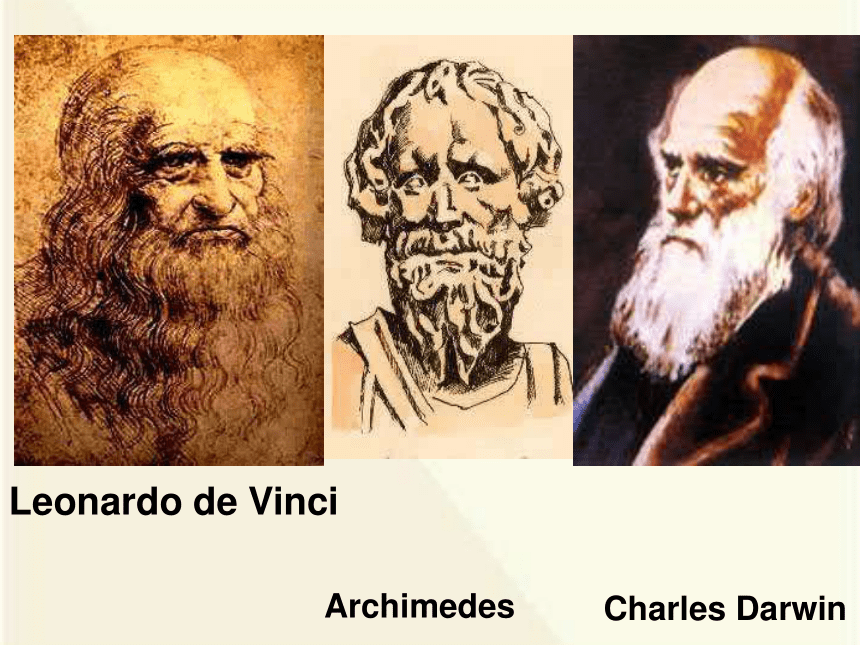
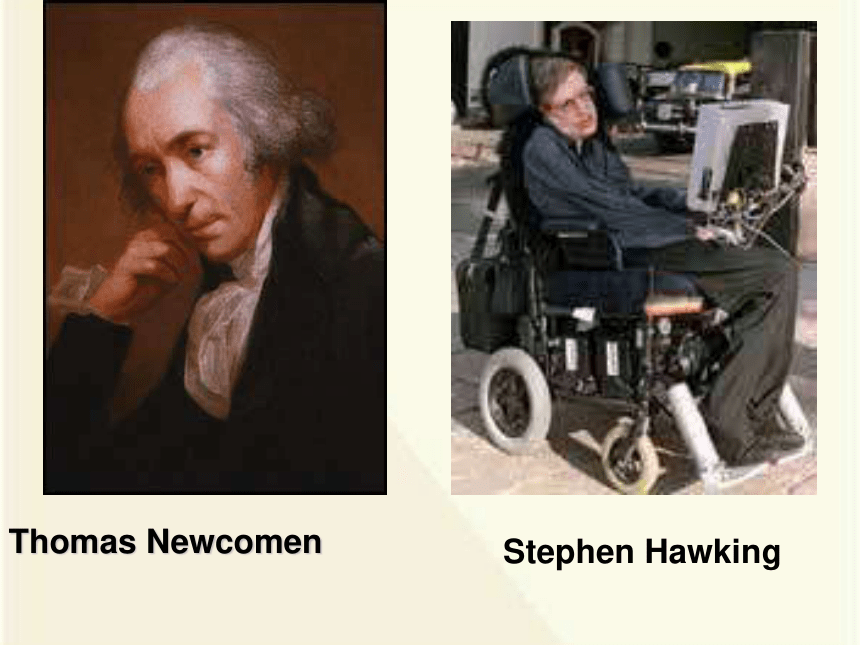
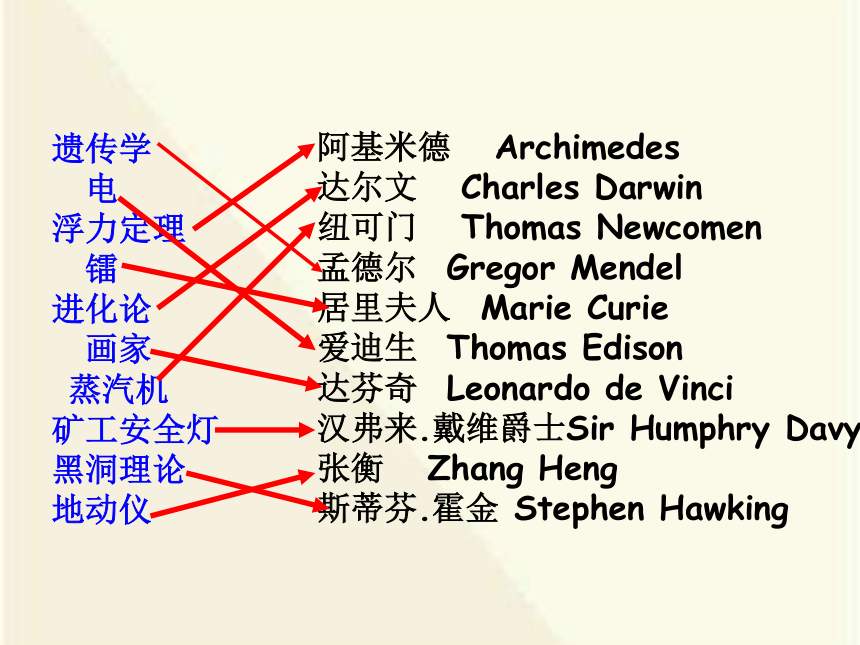
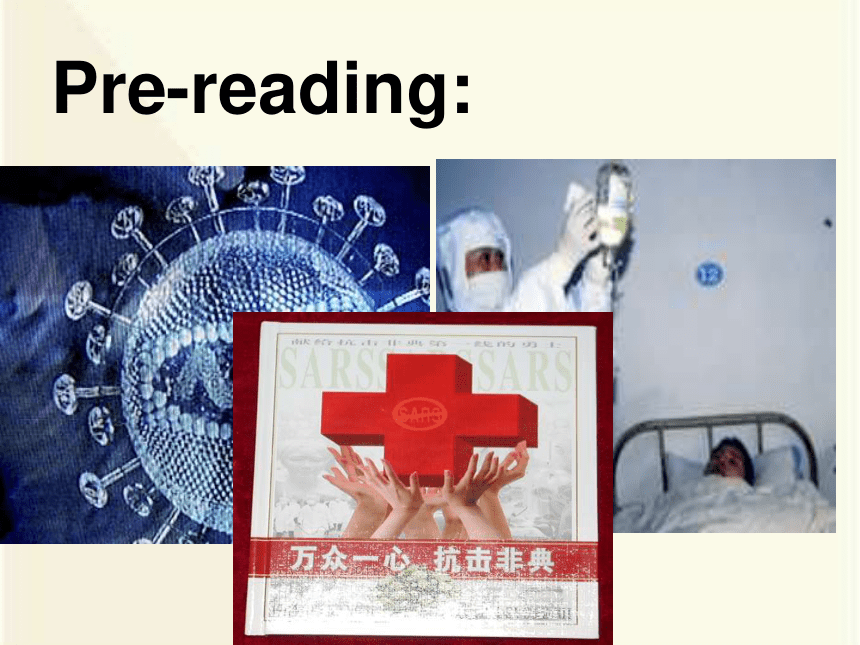
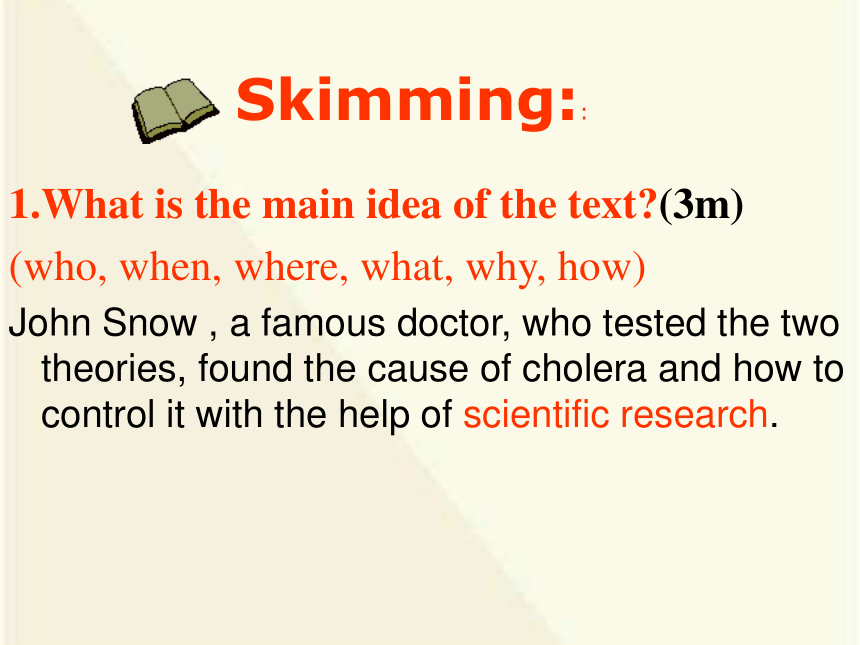
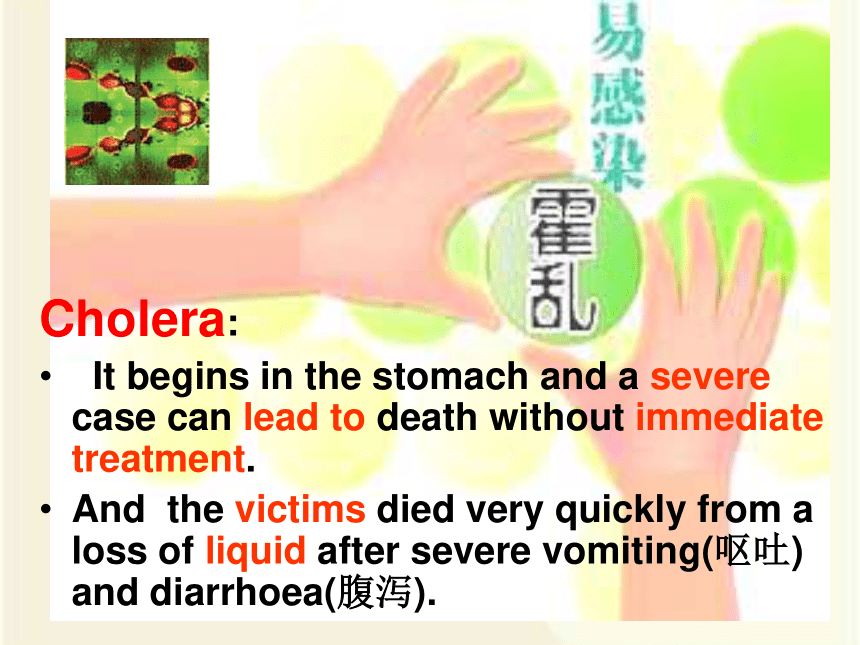
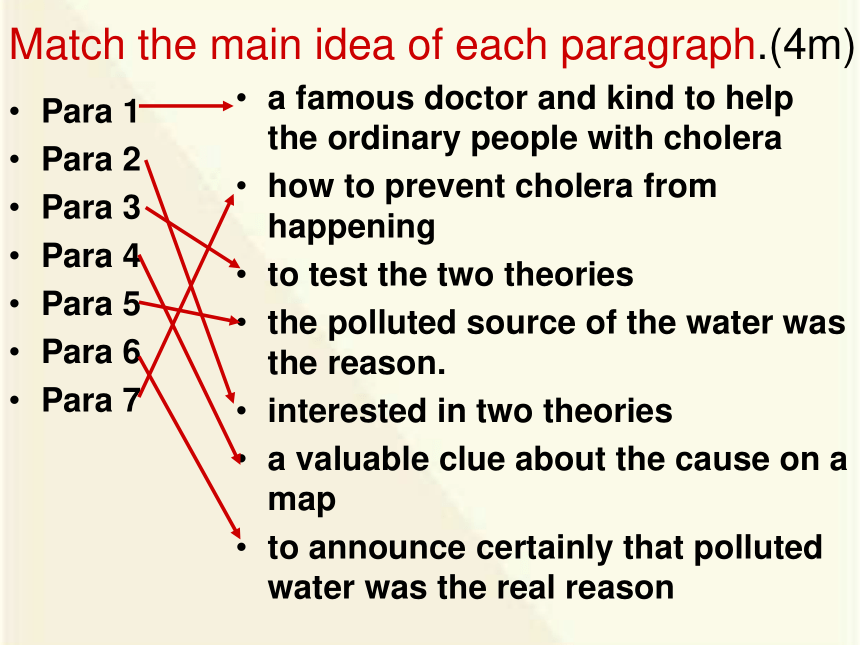
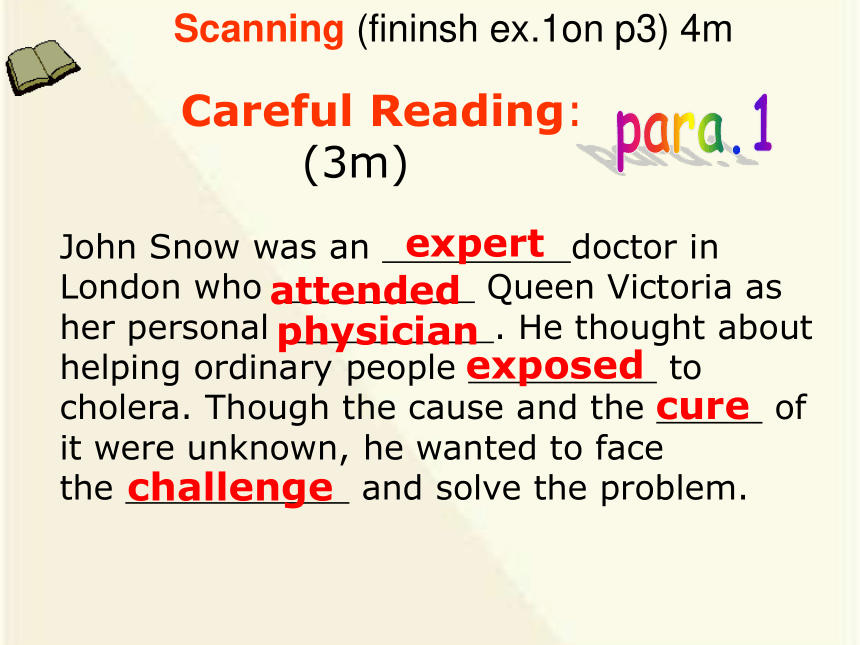
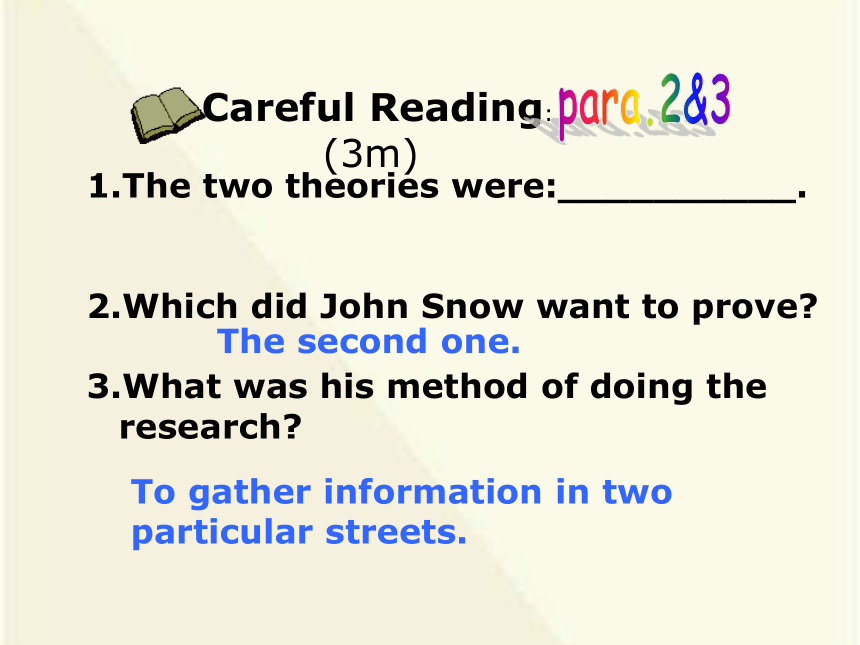
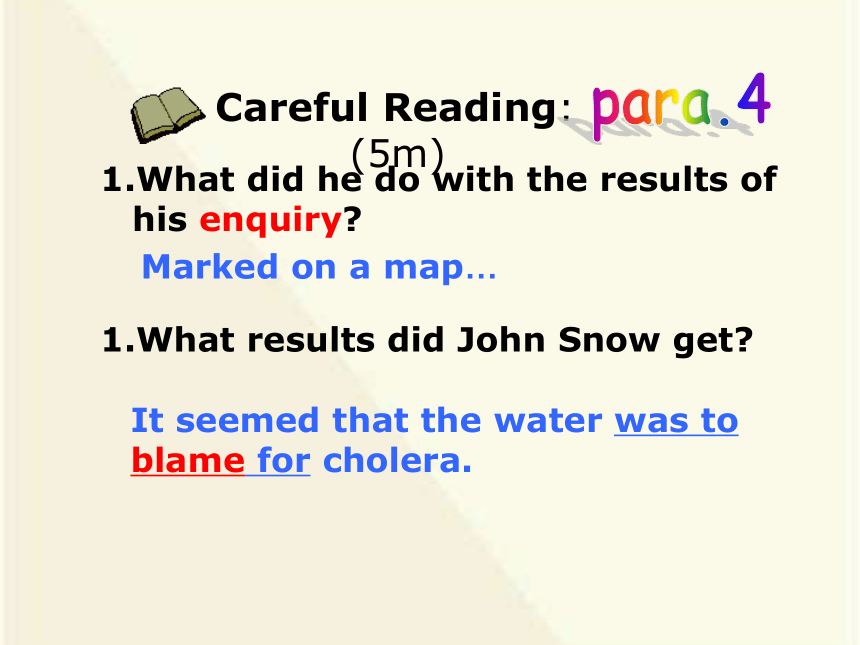

文档简介
课件83张PPT。Unit 1 Great ScientistsReading Warmming up
Prereading
Skimming
Scanning
Careful reading
summaryArchimedesCharles DarwinLeonardo de VinciThomas NewcomenStephen Hawking遗传学
电
浮力定理
镭
进化论
画家
蒸汽机
矿工安全灯
黑洞理论
地动仪
阿基米德 Archimedes
达尔文 Charles Darwin
纽可门 Thomas Newcomen
孟德尔 Gregor Mendel
居里夫人 Marie Curie
爱迪生 Thomas Edison
达芬奇 Leonardo de Vinci
汉弗来.戴维爵士Sir Humphry Davy
张衡 Zhang Heng
斯蒂芬.霍金 Stephen HawkingPre-reading:Skimming::1.What is the main idea of the text?(3m)
(who, when, where, what, why, how)John Snow , a famous doctor, who tested the two theories, found the cause of cholera and how to control it with the help of scientific research.Cholera:
It begins in the stomach and a severe case can lead to death without immediate treatment.
And the victims died very quickly from a loss of liquid after severe vomiting(呕吐) and diarrhoea(腹泻).Match the main idea of each paragraph.(4m)Para 1
Para 2
Para 3
Para 4
Para 5
Para 6
Para 7a famous doctor and kind to help the ordinary people with cholera
how to prevent cholera from happening
to test the two theories
the polluted source of the water was the reason.
interested in two theories
a valuable clue about the cause on a map
to announce certainly that polluted water was the real reasonCareful Reading:
(3m)John Snow was an doctor in London who Queen Victoria as her personal . He thought about helping ordinary people to cholera. Though the cause and the of it were unknown, he wanted to face
the and solve the problem. para.1expertattendedphysicianexposedcurechallengeScanning (fininsh ex.1on p3) 4mCareful Reading:
(3m)The two theories were:__________.
Which did John Snow want to prove?
What was his method of doing the research?
The second one.To gather information in two particular streets.para.2&3Careful Reading:
(5m)para.4What did he do with the results of his enquiry?
What results did John Snow get?
Marked on a map…It seemed that the water was to blame for cholera.Many of the deaths were near the water pump in Broad Street.Part of Snow’s Cholera MapCareful Reading:
(5m)para.5 &61.How did John Snow prove the result he got? 2.T or F questions:
①.The woman lived in Broad Street and she had delivered Water from the pump to her house every day.
②. The deaths suggest that the water carried the virus.Careful Reading:
(3)
para.7
1. Remove…
2. The source …
3. Water companies…Solutions(3)draw a conclusion
Think of a method
Collect results
Make a question
Find a problem
Analyse the results
Find supporting evidence①③②④⑤⑥⑦Stages in setting out a new scientific idea:Dicussing(2m) Summary of the passage (4m) (finish task II )Language Points(思考以下单词及短语的意思和用法) 1.attend vt & vi 2.expose [iks'p?uz] People exposed to SARS should be seperated.① (出席;参加)
② (照顾;看护) attend on/to sb/sth
n. attendance出席,参加
attendant 服务员,侍者 attender参加者① (揭穿) ~one’s plot
②(使暴露在危险之下)
expose sb/sth to sth
① to take in (吸收液体、气体等)
② interest sb(使全神贯注)
词组:be absorbed in被吸引,入迷Plants absorb oxygen.This work had absorbed him for many years.3.absorb vt. 4. announce 宣布; 预告The government announced its new economicWarm sunshine announces the coming of spring.
① (治愈) ②(药,药物)6. put forward的意思及put有关短语你知道多少?Will you be able to cure him of his cancer, doctor?
The cure for this disease hasn’t been found yet.?5. cure: vt./n.put up/ down/ off/ back/ on/ up with/ into practice7. conclusion(得出结论有几种说法)make/draw/come to /reach/arrive at a conclusionin conclusion/ to sum up(总之) 常用于写作结尾处。8. make sense有道理; 理解Can you make sense of the passage?
Your explanation doesn’t make sense.=
Your explanation make no sense.9. cautious常见搭配及名词be cautious about/of… with caution1. put forward 提出 2. draw a conclusion 得出结论 3. be/get under control 在……控制下 ?? be/get out of control失去控制,不能操纵 4. be absorbed in 专心 5. be to blame 应该受责备(用主动形式表示被动) ?? blame sb. for sth. 因某事责备某人 6. in addition 也,另外,此外 7. link...to... 将…和…连接或联系起来 8. die of 因…而死亡(内因) ?? die from 因…而死亡(外因) 1.? John Snow was a well-known doctor in London – so famous, indeed, that he attended Queen Victoria to ease the birth of her babies. 约翰·斯诺曾经是伦敦一位著名的医生――他的确太负盛名了,所以维多利亚女皇生孩子时都是他去照料,帮助她顺利分娩。 2.? But he became inspired when he thought about helping ordinary people exposed to cholera. 但当他一想到要帮助患病的普通老百姓,特别是那些得了霍乱的患者时,他就感到很振奋。 3.? Neither its cause, nor its cure was understood. 人们既不知道它的病源,也不了解它的治疗方法。 4.? He knew it would never be controlled until its cause was found. 他知道,在找到病源之前,疫情是无法控制的。 5.? He became interested in two theories explaining how cholera killed people. 霍乱之所以能致人于死,当时有两种看法,斯诺对这两种推测都很感兴趣。 6. The second suggested that people absorbed this disease into their bodies with their meals. 第二种看法是在吃饭的时候人们把这种病毒引入体内的。 7.? He believed in the second theory but needed to prove he was correct. 他相信第二种说法,但是需要证明他是正确的。 8.? It seemed that the water was to blame. 看来要归罪于饮用水了。 9.? Immediately John Snow told the astonished people in Broad Street to remove the handle from the water pump so it could not be used. 约翰·斯诺马上叫街上惊惶失措的老百姓拆掉水泵的把手,这样水泵就用不成了。
句子翻译练习
8.被污染的水导致许多人死于霍乱。
9.感染SARS病毒的人被隔离起来。(expose…to…)
10.一座大桥连接着深圳和香港(link…to…)
11.政府应该为错误的经济政策而受到谴责(be to blame)
12.只有拆掉水泵的把手才能缓解疫情(Only when…can…)
13.哥白尼的理论正是我们的宇宙观建立的基础(on the basis of ).
14.被怀疑的那个人决心找出真正的罪犯(criminal).(be determined to)
15.老师建议我们在上课之前先预习课文(suggest) language pointsthe way of doing sth.= the way to do … “做…..的方法”
She showed us the way of cleaning it.
= She showed us the way to clean it.
她给我们示范清洗它的办法.与way相关的短语:
by the way 顺便说
by way of … 通过……的方法
lose one’s way 迷路
no way (俚语) 没门,别想
feel one’s way 摸黑走,谨慎从事
on one’s way to…在去…的路上
in this way=by this means=with this method用这种方法Who put forward a theory about black holes?
谁提出了“黑洞”的理论?
He puts forward several interesting plans.
他提出了几项令人感兴趣的计划。
It’s an explanation often put forward by our friend.
这是我们的朋友经常提出的解释。 put forward提出;建议;推荐put 相关短语put up 建立;建造 put up with… 忍受…… examine
1)检查,审查,研讨; 2)考试,考核 3)盘问
They examined our passports very carefully.
The Congress examined and approved the draft budget.
He examined the boys in English.
He was examined by the police.
examination/exam n. 考试
1)conclusion作名词,意为“结束,结论” form one’s conclusion 得出自己的结论
make/draw a conclusion 得出结论
come to/reach/arrive at a conclusion
得出结论
bring...to a conclusion 结束(完成)
in conclusion 最后 It is premature to make that conclusion.
作出那种结论仍为时过早。
I will in conclusion say a few words about my visit to Tokyo.
最后,我对我的东京之行说几句。2)conclude作动词,“结束;断定;决定”。
to conclude(作插入语)最后,作为总结
(= to sum up)
To conclude, I think smoking does more harm than good to us.
analyse (analyze) v分析,分解
analysis n
make an analysis of 分析
(=analyse sth)attend v.? 出席;参加;照顾;护理
attend sb. 照料、护理某人?
attend sth. 参加(讲座、活动等)
attend class/ a lecture/ a meeting
attendance nexpose v.
1)expose ….to…. 把……暴露于……之下(之中)
He exposes his skin to the sun. 他把皮肤暴露在阳光下.
be exposed to(暴露)
2)揭露;揭发
He exposed their plot.他揭穿了他们的阴谋.
I threatened to expose him ( to the police).我威胁要(向警察)揭发他.
cure n.& v.?治愈;痊愈治愈;治疗
可构成cure sb.of sth. 句型 control vt. 统治,控制2)n.控制,统治,掌握The driver __________his car and it knocked into a tree.
司机对车失去控制,车撞到树上。
The car was ___________and ran into a wall.车失去控制,撞到了墙上。
Mr Brown is ___________the shop./The shop is ___________Mr Brown.
布朗先生管理这家商店。
The money is _______________Mr Brown.钱财由布朗先生掌管。lost control ofout of controlin control ofin the control ofunder the control ofabsorb vt.? 吸收(光,气体,知识等);吸引
Black cloth absorbs light.
黑布吸收光线。?
固定搭配:?
be absorbed in =put one’s heart into专注;聚精会神?
The old man was completely absorbed in the book.
老人全神贯注地读这本书。
absorb...into...吸收
blame v.责备;指责,归咎于? blame sb for sth/doing sth 因某事
blame sth on sb 把某事归咎于某人
be to blame (for sth) 应(为...)承担责任,该(为...)受责备
accept/bear/take the blame for sth 对某事负责任
put/lay the blame (for sth) on sb 将某事归咎于某人look into调查,了解,研究;朝……里面看?
He looks into her face with great interest.?
他饶有兴趣地注视着她的脸。?
【考点聚焦】 与one’s face/eyes等连用,表示“注视” 和look组成的其他短语?
look around/round/about环顾四周 look after照顾;照料?
look back回头看 look back to/upon/on 回顾;回想?
look down upon 俯视;轻视 look for 寻求;寻找?look forward to (doing) 盼望 look on旁观?
look on/upon...as把……看作 look out往外看;注意;当心?
look through透过……看;浏览 look up抬头看;查看 slow down 放慢速度,减速
speed up 加快速度 in addition (to)此外;还 ?
We saw a Mickey Mouse cartoon in addition to the cowboy movie.?
我们除了看西部牛仔片之外还看了一个米老鼠动画片。?
【考点聚焦】 在写作文时,此结构在罗列平行观点时,类似于:what’s more;moreover。link...to...把……与……连接;把...跟...联系起来 ?
Fingerprints linked the suspect to the crime.
指纹印把嫌疑犯与所犯罪行联系在一起。
be linked to ? ?
【考点聚焦】 同义词组:connect...with...与……有联系?
have something to do with...与……有关系announce vt.
1)to make known publicly 发表,告知,宣布……
The news was announced to the public on TV. 这则消息经由电视向大众宣布。2)(事情)显示……;预示
The bright flowers announced that spring was here.
鲜艳的花朵显示春天已经来到。 instruct sb…(not) to do …
吩咐/指导/命令某人(不)做某事
be instructed to do sth
instruction n 说明,须知,指令
instructor n 教练, 讲师 He instructed me to deliver it to a customer. 他吩咐我把东西送去给顾客。 Those boys were instructed to
wait there. 那些男孩被通知在那等。 contribute v.
贡献,捐助,捐献;投稿
It was generous of her to contribute such a large sum. 她很大方,捐助了这么大笔钱。
She asked him to contribute an article on European affairs. 她约他写一篇有关欧洲情况的文稿。 contribute sth to sb/sth
捐款,捐助We _________________the poor.
我们捐赠衣物救济贫民。
He contributed poems to the magazine.
他投诗稿给杂志。contributed clothing tocontribute to :为…作出贡献,为…撰稿,向…投稿,捐助,有助于,促进
Many people had cheerfully contributed to the Red Cross. 许多人都欣然向红十字会捐款。
His carelessness contributed to the accident. 他的粗心大意是造成这次事故的原因之一。
Drink contributed to his ruin. 饮酒促成他的毁灭。 contribution n.贡献;捐献(物)besides, except和apart from用法之异同
1.besides意为“除……以外(还包括)”
Besides John, we also went there.
除了约翰外,我们也去了那里。
Who else heard of it besides you?
除了你外还有谁听说过此事。
2.except意为“除……以外(不包括)”
He cleaned all the rooms except the bathroom.除了洗澡间,他把所有的房间都清扫了。
I looked everywhere except here.
除了这里外,我找遍了所有地方。3.apart from有两种含义:
1)相当于besides.意为“除……以外(还包括)”
Apart from my mother tongue, I speak several foreign languages as well.
除了母语外,我还会讲好几种外语。
He has no other interests, apart from his work.
除了工作外,他别无其他兴趣。
2)相当于except.意为“除……以外(不包括)”
I like all the subjects apart from English.
除了英语外,我喜欢所有学科。
They all went to see the movie except him.
除了他外,他们都去看电影了。lead to通向
All roads lead to Rome. 条条大道通罗马。
Can this way _________________? 这条路能到邮局吗?
lead to the post office导致,引起
_________________________disastrous consequences. 这样一个错误可能导致灾难性的后果。 Such a mistake would perhaps lead to make sense 有意义,有道理,讲得通 He doesn’t talk much, but what he says makes sense. 他话不多,但言之有理。 make sense of sth.理解.弄懂(不易理解的事物)
Can you _________________________________at all?你究竟能不能理解这篇文章的意思?make any sense of this this articlemake no sense无意义,行不通 Your explanation doesn't make sense/make
no sense.你的解释是没道理的 completely adv. 彻底地,完全地
completion n. 完成,结束complete(1) adj. 完全的,彻底的
The police were in complete control of the situation.(2) vt.完成,结束The building took two years to complete. The new laboratory building___________________.will be completed next Friday enthusiastic adj.
be enthusiastic about sth. /doing sth.
热衷于,对…充满热情
He became enthusiastic about classical music.
他变成了一个古典音乐迷。
enthusiasm n. 热情,热心
enthusiasm for sth. / for doing sth.
He has a great enthusiasm for personal computers.
他热衷于个人电脑。
cautious adj. 小心的,警慎的
be cautious about/of sb/sth
对...小心,谨慎
You should be cautious of the strangers.
你应该小心提防陌生人。
caution n. 小心,警慎
with caution 留心,小心地
对待疾病要小心.
Disease should_____________________. be treated with cautionGrammarPast paticiple1)在句中的位置:
a.单个的过去分词作定语时,位于它所修饰的名词或代词前面过去分词作定语the affected people
a broken heart
a lost dog
a risen sun
a broken glass
受感染的人一颗破碎的心 丧家之犬 已升起的太阳被打破的玻璃杯 b. 过去分词短语作定语:通常后置,其作用相当于定语从句。People exposed to cholera
the book recommended by Jack
the machines produced last year
= people who was exposed to cholera= the book which was recommended by Jack= the machines which were produced last year2)所表示的时间
过去分词作定语时,所表示的动作在谓语所表示的动作之前发生,(或者没有一定的时间性)。The letter posted yesterday will soon reach him.
Have you read the books written by the young writer? ?3)语法功能
过去分词或过去分词短语作定语时,其功能相当于一个定语从句。 1.The stolen bike belongs to Jack. ?The bike which was stolen belongs to Jack. 2.The lecture given by Professor Zhang is about environment protection. ?The lecture which was given by Professor Zhang is about the environment protection. 过去分词与现在分词作定语的区别:the changing world
the changed world
boiling water
boiled water
fading flowers
faded flowers
a developing country
a developed country(正在变化的)
(变化了的)(正在沸腾的)(已经沸腾过的)
(正在凋谢的)
(已经凋谢的)(发展中的)
(发达的)a drowning man
a drowned man
falling leaves
fallen leaves
a retired worker
an escaped prisoner 快要淹死的人已经淹死的人正在飘落的树叶落叶退休工人逃犯1.Do you know the boy ____(lie) under the big tree?
2. The woman _____(sell) vegetables has gone.
3.The wheat is watered by water _____(bring) from a pond.
4. He is a leader________ (respect) by the people.Attention:过去分词修饰 something, everything, anything, nothing, somebody, nobody,those 等不定代词时,要放在这些词后面。Nothing reported ( in the newspaper) interested him.
Is?there?anything?unsolved?? There?is?noting?changed?here?since?I?left?this?town.3 及物动词的过去分词(done)与现在分词的被动式
(being done)都可以表示“被动”,但前者多表示一个
完成了的动作,而后者则表示一个正在进行的动作.the problem discussed yesterday
The problem being discussed II. 过去分词做表语(predicative)1 过去分词(短语)作表语时,其作用相当于adj.,
说明的是主语的状态
All the windows are broken.
All hope is gone.
This article is well written.
He appeared more satisfied with my work.
常见作表语的过去分词有: disappointed, drunk, amused, frightened, married, excited, experienced, interested, confused, pleased, puzzled, satisfied, tired, worried等。 2 过去分词做表语与现在分词做表语的区别ing作表语与-ed作表语有何区别?The result of the test is disappointing.
? I feel disappointed with the result of the test.The story is very interesting
He is interested in the book.What a surprising result !
I am surprised at what he said.
注意
过去分词作表语时和动词的被动语态结构相似,但两
者表达的意思明显不同,前者说明主语的特点及所处的
状态,而后者强调动作。The glass is broken.
The glass is broken by my little brother.Compete the sentences using the right form of the given verb.
I had nothing to do. I was __________ (bore) and lonely.
Jack looked even more _______ (amaze) than he felt.
The results were very _____________(disappoint).
I was thanked by the _____________ (satisfy) customer.
The girl ___________ (dress) in red is my daughter.
Last Monday our class went on an ____________ (organise) trip. bored amazed disappointing satisfied dressed organised汉译英1. _____________ (开水)
2. ________________ (一个破碎的茶杯)
3. three ____________________ (受伤的士兵)
4.We lived in the house __________________
(我舅舅们修建的).
5. Any medicine ________(服用) without the
advice of a doctor can cause trouble.
6. We spent two hours discussing the plan ____
______________ (她制定的).
7. Most of the people
___________________
(被邀请参加宴会的) were famous scientists.
8. Lessons _____________ (易学的)are soon
forgotten.
9. The computer center _________________
(开办) last week is popular with the students .ExercisesDon’t use words, expressions, or phrases ____ only to people with specific knowledge.
A. being known B. having been known
C. to be known D. known
As we joined the big crowd, I got ____ from my friends
A. separated B. spared C. lost D. missed
Cleaning women in big cities usually get ___ by the hour.
A. pay B. paying C. paid D. to pay
The Olympic Games, ____ in 776 B. C. , did not include women players until 1912.
A. first playing B. to be first played
C. first played D. to be first playingDACC5. The research is so designed that once ___ nothing can be done to change it.
A. begins B. having begun
C. beginning D. begun
6. The television is a ___ machine.
A. newly-invented B. new-invented
C. newly-invent D. newly-invention
7. ___ English is different from ____ English in many ways.
A. Spoken, written B. Speaking, written
C. Spoken, writing D. Speak, write
DAA8. The lady said she would buy a gift for her daughter with the ______.
A. 20 dollars remained B. 20 dollars to remain
C. remained 20 dollars D. remaining 20 dollars
9. Prices of daily goods ___ through a computer can be lower than some store prices.
A. are bought B. bought
C. been bought D. buying
10. Mr Smith, ____ of the ___ speech, started to read a novel.
A. tired; boring B. tiring; bored
C. tired; bored D. tiring; boringDBA
Prereading
Skimming
Scanning
Careful reading
summaryArchimedesCharles DarwinLeonardo de VinciThomas NewcomenStephen Hawking遗传学
电
浮力定理
镭
进化论
画家
蒸汽机
矿工安全灯
黑洞理论
地动仪
阿基米德 Archimedes
达尔文 Charles Darwin
纽可门 Thomas Newcomen
孟德尔 Gregor Mendel
居里夫人 Marie Curie
爱迪生 Thomas Edison
达芬奇 Leonardo de Vinci
汉弗来.戴维爵士Sir Humphry Davy
张衡 Zhang Heng
斯蒂芬.霍金 Stephen HawkingPre-reading:Skimming::1.What is the main idea of the text?(3m)
(who, when, where, what, why, how)John Snow , a famous doctor, who tested the two theories, found the cause of cholera and how to control it with the help of scientific research.Cholera:
It begins in the stomach and a severe case can lead to death without immediate treatment.
And the victims died very quickly from a loss of liquid after severe vomiting(呕吐) and diarrhoea(腹泻).Match the main idea of each paragraph.(4m)Para 1
Para 2
Para 3
Para 4
Para 5
Para 6
Para 7a famous doctor and kind to help the ordinary people with cholera
how to prevent cholera from happening
to test the two theories
the polluted source of the water was the reason.
interested in two theories
a valuable clue about the cause on a map
to announce certainly that polluted water was the real reasonCareful Reading:
(3m)John Snow was an doctor in London who Queen Victoria as her personal . He thought about helping ordinary people to cholera. Though the cause and the of it were unknown, he wanted to face
the and solve the problem. para.1expertattendedphysicianexposedcurechallengeScanning (fininsh ex.1on p3) 4mCareful Reading:
(3m)The two theories were:__________.
Which did John Snow want to prove?
What was his method of doing the research?
The second one.To gather information in two particular streets.para.2&3Careful Reading:
(5m)para.4What did he do with the results of his enquiry?
What results did John Snow get?
Marked on a map…It seemed that the water was to blame for cholera.Many of the deaths were near the water pump in Broad Street.Part of Snow’s Cholera MapCareful Reading:
(5m)para.5 &61.How did John Snow prove the result he got? 2.T or F questions:
①.The woman lived in Broad Street and she had delivered Water from the pump to her house every day.
②. The deaths suggest that the water carried the virus.Careful Reading:
(3)
para.7
1. Remove…
2. The source …
3. Water companies…Solutions(3)draw a conclusion
Think of a method
Collect results
Make a question
Find a problem
Analyse the results
Find supporting evidence①③②④⑤⑥⑦Stages in setting out a new scientific idea:Dicussing(2m) Summary of the passage (4m) (finish task II )Language Points(思考以下单词及短语的意思和用法) 1.attend vt & vi 2.expose [iks'p?uz] People exposed to SARS should be seperated.① (出席;参加)
② (照顾;看护) attend on/to sb/sth
n. attendance出席,参加
attendant 服务员,侍者 attender参加者① (揭穿) ~one’s plot
②(使暴露在危险之下)
expose sb/sth to sth
① to take in (吸收液体、气体等)
② interest sb(使全神贯注)
词组:be absorbed in被吸引,入迷Plants absorb oxygen.This work had absorbed him for many years.3.absorb vt. 4. announce 宣布; 预告The government announced its new economicWarm sunshine announces the coming of spring.
① (治愈) ②(药,药物)6. put forward的意思及put有关短语你知道多少?Will you be able to cure him of his cancer, doctor?
The cure for this disease hasn’t been found yet.?5. cure: vt./n.put up/ down/ off/ back/ on/ up with/ into practice7. conclusion(得出结论有几种说法)make/draw/come to /reach/arrive at a conclusionin conclusion/ to sum up(总之) 常用于写作结尾处。8. make sense有道理; 理解Can you make sense of the passage?
Your explanation doesn’t make sense.=
Your explanation make no sense.9. cautious常见搭配及名词be cautious about/of… with caution1. put forward 提出 2. draw a conclusion 得出结论 3. be/get under control 在……控制下 ?? be/get out of control失去控制,不能操纵 4. be absorbed in 专心 5. be to blame 应该受责备(用主动形式表示被动) ?? blame sb. for sth. 因某事责备某人 6. in addition 也,另外,此外 7. link...to... 将…和…连接或联系起来 8. die of 因…而死亡(内因) ?? die from 因…而死亡(外因) 1.? John Snow was a well-known doctor in London – so famous, indeed, that he attended Queen Victoria to ease the birth of her babies. 约翰·斯诺曾经是伦敦一位著名的医生――他的确太负盛名了,所以维多利亚女皇生孩子时都是他去照料,帮助她顺利分娩。 2.? But he became inspired when he thought about helping ordinary people exposed to cholera. 但当他一想到要帮助患病的普通老百姓,特别是那些得了霍乱的患者时,他就感到很振奋。 3.? Neither its cause, nor its cure was understood. 人们既不知道它的病源,也不了解它的治疗方法。 4.? He knew it would never be controlled until its cause was found. 他知道,在找到病源之前,疫情是无法控制的。 5.? He became interested in two theories explaining how cholera killed people. 霍乱之所以能致人于死,当时有两种看法,斯诺对这两种推测都很感兴趣。 6. The second suggested that people absorbed this disease into their bodies with their meals. 第二种看法是在吃饭的时候人们把这种病毒引入体内的。 7.? He believed in the second theory but needed to prove he was correct. 他相信第二种说法,但是需要证明他是正确的。 8.? It seemed that the water was to blame. 看来要归罪于饮用水了。 9.? Immediately John Snow told the astonished people in Broad Street to remove the handle from the water pump so it could not be used. 约翰·斯诺马上叫街上惊惶失措的老百姓拆掉水泵的把手,这样水泵就用不成了。
句子翻译练习
8.被污染的水导致许多人死于霍乱。
9.感染SARS病毒的人被隔离起来。(expose…to…)
10.一座大桥连接着深圳和香港(link…to…)
11.政府应该为错误的经济政策而受到谴责(be to blame)
12.只有拆掉水泵的把手才能缓解疫情(Only when…can…)
13.哥白尼的理论正是我们的宇宙观建立的基础(on the basis of ).
14.被怀疑的那个人决心找出真正的罪犯(criminal).(be determined to)
15.老师建议我们在上课之前先预习课文(suggest) language pointsthe way of doing sth.= the way to do … “做…..的方法”
She showed us the way of cleaning it.
= She showed us the way to clean it.
她给我们示范清洗它的办法.与way相关的短语:
by the way 顺便说
by way of … 通过……的方法
lose one’s way 迷路
no way (俚语) 没门,别想
feel one’s way 摸黑走,谨慎从事
on one’s way to…在去…的路上
in this way=by this means=with this method用这种方法Who put forward a theory about black holes?
谁提出了“黑洞”的理论?
He puts forward several interesting plans.
他提出了几项令人感兴趣的计划。
It’s an explanation often put forward by our friend.
这是我们的朋友经常提出的解释。 put forward提出;建议;推荐put 相关短语put up 建立;建造 put up with… 忍受…… examine
1)检查,审查,研讨; 2)考试,考核 3)盘问
They examined our passports very carefully.
The Congress examined and approved the draft budget.
He examined the boys in English.
He was examined by the police.
examination/exam n. 考试
1)conclusion作名词,意为“结束,结论” form one’s conclusion 得出自己的结论
make/draw a conclusion 得出结论
come to/reach/arrive at a conclusion
得出结论
bring...to a conclusion 结束(完成)
in conclusion 最后 It is premature to make that conclusion.
作出那种结论仍为时过早。
I will in conclusion say a few words about my visit to Tokyo.
最后,我对我的东京之行说几句。2)conclude作动词,“结束;断定;决定”。
to conclude(作插入语)最后,作为总结
(= to sum up)
To conclude, I think smoking does more harm than good to us.
analyse (analyze) v分析,分解
analysis n
make an analysis of 分析
(=analyse sth)attend v.? 出席;参加;照顾;护理
attend sb. 照料、护理某人?
attend sth. 参加(讲座、活动等)
attend class/ a lecture/ a meeting
attendance nexpose v.
1)expose ….to…. 把……暴露于……之下(之中)
He exposes his skin to the sun. 他把皮肤暴露在阳光下.
be exposed to(暴露)
2)揭露;揭发
He exposed their plot.他揭穿了他们的阴谋.
I threatened to expose him ( to the police).我威胁要(向警察)揭发他.
cure n.& v.?治愈;痊愈治愈;治疗
可构成cure sb.of sth. 句型 control vt. 统治,控制2)n.控制,统治,掌握The driver __________his car and it knocked into a tree.
司机对车失去控制,车撞到树上。
The car was ___________and ran into a wall.车失去控制,撞到了墙上。
Mr Brown is ___________the shop./The shop is ___________Mr Brown.
布朗先生管理这家商店。
The money is _______________Mr Brown.钱财由布朗先生掌管。lost control ofout of controlin control ofin the control ofunder the control ofabsorb vt.? 吸收(光,气体,知识等);吸引
Black cloth absorbs light.
黑布吸收光线。?
固定搭配:?
be absorbed in =put one’s heart into专注;聚精会神?
The old man was completely absorbed in the book.
老人全神贯注地读这本书。
absorb...into...吸收
blame v.责备;指责,归咎于? blame sb for sth/doing sth 因某事
blame sth on sb 把某事归咎于某人
be to blame (for sth) 应(为...)承担责任,该(为...)受责备
accept/bear/take the blame for sth 对某事负责任
put/lay the blame (for sth) on sb 将某事归咎于某人look into调查,了解,研究;朝……里面看?
He looks into her face with great interest.?
他饶有兴趣地注视着她的脸。?
【考点聚焦】 与one’s face/eyes等连用,表示“注视” 和look组成的其他短语?
look around/round/about环顾四周 look after照顾;照料?
look back回头看 look back to/upon/on 回顾;回想?
look down upon 俯视;轻视 look for 寻求;寻找?look forward to (doing) 盼望 look on旁观?
look on/upon...as把……看作 look out往外看;注意;当心?
look through透过……看;浏览 look up抬头看;查看 slow down 放慢速度,减速
speed up 加快速度 in addition (to)此外;还 ?
We saw a Mickey Mouse cartoon in addition to the cowboy movie.?
我们除了看西部牛仔片之外还看了一个米老鼠动画片。?
【考点聚焦】 在写作文时,此结构在罗列平行观点时,类似于:what’s more;moreover。link...to...把……与……连接;把...跟...联系起来 ?
Fingerprints linked the suspect to the crime.
指纹印把嫌疑犯与所犯罪行联系在一起。
be linked to ? ?
【考点聚焦】 同义词组:connect...with...与……有联系?
have something to do with...与……有关系announce vt.
1)to make known publicly 发表,告知,宣布……
The news was announced to the public on TV. 这则消息经由电视向大众宣布。2)(事情)显示……;预示
The bright flowers announced that spring was here.
鲜艳的花朵显示春天已经来到。 instruct sb…(not) to do …
吩咐/指导/命令某人(不)做某事
be instructed to do sth
instruction n 说明,须知,指令
instructor n 教练, 讲师 He instructed me to deliver it to a customer. 他吩咐我把东西送去给顾客。 Those boys were instructed to
wait there. 那些男孩被通知在那等。 contribute v.
贡献,捐助,捐献;投稿
It was generous of her to contribute such a large sum. 她很大方,捐助了这么大笔钱。
She asked him to contribute an article on European affairs. 她约他写一篇有关欧洲情况的文稿。 contribute sth to sb/sth
捐款,捐助We _________________the poor.
我们捐赠衣物救济贫民。
He contributed poems to the magazine.
他投诗稿给杂志。contributed clothing tocontribute to :为…作出贡献,为…撰稿,向…投稿,捐助,有助于,促进
Many people had cheerfully contributed to the Red Cross. 许多人都欣然向红十字会捐款。
His carelessness contributed to the accident. 他的粗心大意是造成这次事故的原因之一。
Drink contributed to his ruin. 饮酒促成他的毁灭。 contribution n.贡献;捐献(物)besides, except和apart from用法之异同
1.besides意为“除……以外(还包括)”
Besides John, we also went there.
除了约翰外,我们也去了那里。
Who else heard of it besides you?
除了你外还有谁听说过此事。
2.except意为“除……以外(不包括)”
He cleaned all the rooms except the bathroom.除了洗澡间,他把所有的房间都清扫了。
I looked everywhere except here.
除了这里外,我找遍了所有地方。3.apart from有两种含义:
1)相当于besides.意为“除……以外(还包括)”
Apart from my mother tongue, I speak several foreign languages as well.
除了母语外,我还会讲好几种外语。
He has no other interests, apart from his work.
除了工作外,他别无其他兴趣。
2)相当于except.意为“除……以外(不包括)”
I like all the subjects apart from English.
除了英语外,我喜欢所有学科。
They all went to see the movie except him.
除了他外,他们都去看电影了。lead to通向
All roads lead to Rome. 条条大道通罗马。
Can this way _________________? 这条路能到邮局吗?
lead to the post office导致,引起
_________________________disastrous consequences. 这样一个错误可能导致灾难性的后果。 Such a mistake would perhaps lead to make sense 有意义,有道理,讲得通 He doesn’t talk much, but what he says makes sense. 他话不多,但言之有理。 make sense of sth.理解.弄懂(不易理解的事物)
Can you _________________________________at all?你究竟能不能理解这篇文章的意思?make any sense of this this articlemake no sense无意义,行不通 Your explanation doesn't make sense/make
no sense.你的解释是没道理的 completely adv. 彻底地,完全地
completion n. 完成,结束complete(1) adj. 完全的,彻底的
The police were in complete control of the situation.(2) vt.完成,结束The building took two years to complete. The new laboratory building___________________.will be completed next Friday enthusiastic adj.
be enthusiastic about sth. /doing sth.
热衷于,对…充满热情
He became enthusiastic about classical music.
他变成了一个古典音乐迷。
enthusiasm n. 热情,热心
enthusiasm for sth. / for doing sth.
He has a great enthusiasm for personal computers.
他热衷于个人电脑。
cautious adj. 小心的,警慎的
be cautious about/of sb/sth
对...小心,谨慎
You should be cautious of the strangers.
你应该小心提防陌生人。
caution n. 小心,警慎
with caution 留心,小心地
对待疾病要小心.
Disease should_____________________. be treated with cautionGrammarPast paticiple1)在句中的位置:
a.单个的过去分词作定语时,位于它所修饰的名词或代词前面过去分词作定语the affected people
a broken heart
a lost dog
a risen sun
a broken glass
受感染的人一颗破碎的心 丧家之犬 已升起的太阳被打破的玻璃杯 b. 过去分词短语作定语:通常后置,其作用相当于定语从句。People exposed to cholera
the book recommended by Jack
the machines produced last year
= people who was exposed to cholera= the book which was recommended by Jack= the machines which were produced last year2)所表示的时间
过去分词作定语时,所表示的动作在谓语所表示的动作之前发生,(或者没有一定的时间性)。The letter posted yesterday will soon reach him.
Have you read the books written by the young writer? ?3)语法功能
过去分词或过去分词短语作定语时,其功能相当于一个定语从句。 1.The stolen bike belongs to Jack. ?The bike which was stolen belongs to Jack. 2.The lecture given by Professor Zhang is about environment protection. ?The lecture which was given by Professor Zhang is about the environment protection. 过去分词与现在分词作定语的区别:the changing world
the changed world
boiling water
boiled water
fading flowers
faded flowers
a developing country
a developed country(正在变化的)
(变化了的)(正在沸腾的)(已经沸腾过的)
(正在凋谢的)
(已经凋谢的)(发展中的)
(发达的)a drowning man
a drowned man
falling leaves
fallen leaves
a retired worker
an escaped prisoner 快要淹死的人已经淹死的人正在飘落的树叶落叶退休工人逃犯1.Do you know the boy ____(lie) under the big tree?
2. The woman _____(sell) vegetables has gone.
3.The wheat is watered by water _____(bring) from a pond.
4. He is a leader________ (respect) by the people.Attention:过去分词修饰 something, everything, anything, nothing, somebody, nobody,those 等不定代词时,要放在这些词后面。Nothing reported ( in the newspaper) interested him.
Is?there?anything?unsolved?? There?is?noting?changed?here?since?I?left?this?town.3 及物动词的过去分词(done)与现在分词的被动式
(being done)都可以表示“被动”,但前者多表示一个
完成了的动作,而后者则表示一个正在进行的动作.the problem discussed yesterday
The problem being discussed II. 过去分词做表语(predicative)1 过去分词(短语)作表语时,其作用相当于adj.,
说明的是主语的状态
All the windows are broken.
All hope is gone.
This article is well written.
He appeared more satisfied with my work.
常见作表语的过去分词有: disappointed, drunk, amused, frightened, married, excited, experienced, interested, confused, pleased, puzzled, satisfied, tired, worried等。 2 过去分词做表语与现在分词做表语的区别ing作表语与-ed作表语有何区别?The result of the test is disappointing.
? I feel disappointed with the result of the test.The story is very interesting
He is interested in the book.What a surprising result !
I am surprised at what he said.
注意
过去分词作表语时和动词的被动语态结构相似,但两
者表达的意思明显不同,前者说明主语的特点及所处的
状态,而后者强调动作。The glass is broken.
The glass is broken by my little brother.Compete the sentences using the right form of the given verb.
I had nothing to do. I was __________ (bore) and lonely.
Jack looked even more _______ (amaze) than he felt.
The results were very _____________(disappoint).
I was thanked by the _____________ (satisfy) customer.
The girl ___________ (dress) in red is my daughter.
Last Monday our class went on an ____________ (organise) trip. bored amazed disappointing satisfied dressed organised汉译英1. _____________ (开水)
2. ________________ (一个破碎的茶杯)
3. three ____________________ (受伤的士兵)
4.We lived in the house __________________
(我舅舅们修建的).
5. Any medicine ________(服用) without the
advice of a doctor can cause trouble.
6. We spent two hours discussing the plan ____
______________ (她制定的).
7. Most of the people
___________________
(被邀请参加宴会的) were famous scientists.
8. Lessons _____________ (易学的)are soon
forgotten.
9. The computer center _________________
(开办) last week is popular with the students .ExercisesDon’t use words, expressions, or phrases ____ only to people with specific knowledge.
A. being known B. having been known
C. to be known D. known
As we joined the big crowd, I got ____ from my friends
A. separated B. spared C. lost D. missed
Cleaning women in big cities usually get ___ by the hour.
A. pay B. paying C. paid D. to pay
The Olympic Games, ____ in 776 B. C. , did not include women players until 1912.
A. first playing B. to be first played
C. first played D. to be first playingDACC5. The research is so designed that once ___ nothing can be done to change it.
A. begins B. having begun
C. beginning D. begun
6. The television is a ___ machine.
A. newly-invented B. new-invented
C. newly-invent D. newly-invention
7. ___ English is different from ____ English in many ways.
A. Spoken, written B. Speaking, written
C. Spoken, writing D. Speak, write
DAA8. The lady said she would buy a gift for her daughter with the ______.
A. 20 dollars remained B. 20 dollars to remain
C. remained 20 dollars D. remaining 20 dollars
9. Prices of daily goods ___ through a computer can be lower than some store prices.
A. are bought B. bought
C. been bought D. buying
10. Mr Smith, ____ of the ___ speech, started to read a novel.
A. tired; boring B. tiring; bored
C. tired; bored D. tiring; boringDBA
